Madrid, Spain: 2025 Business Aviation Destination guide
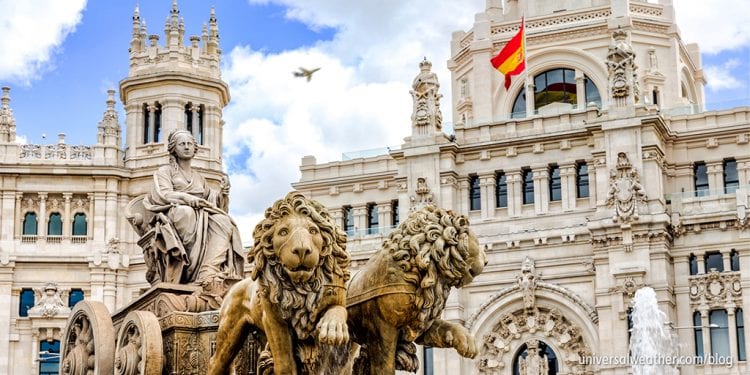
For more detailed information on specific destinations within Spain, please visit our articles on:
Operating to Madrid is relatively uncomplicated, accommodating, and flexible. Making arrangements as soon as your schedule is known is always advised to secure your best options—especially during peak periods. Here’s what you need to know.
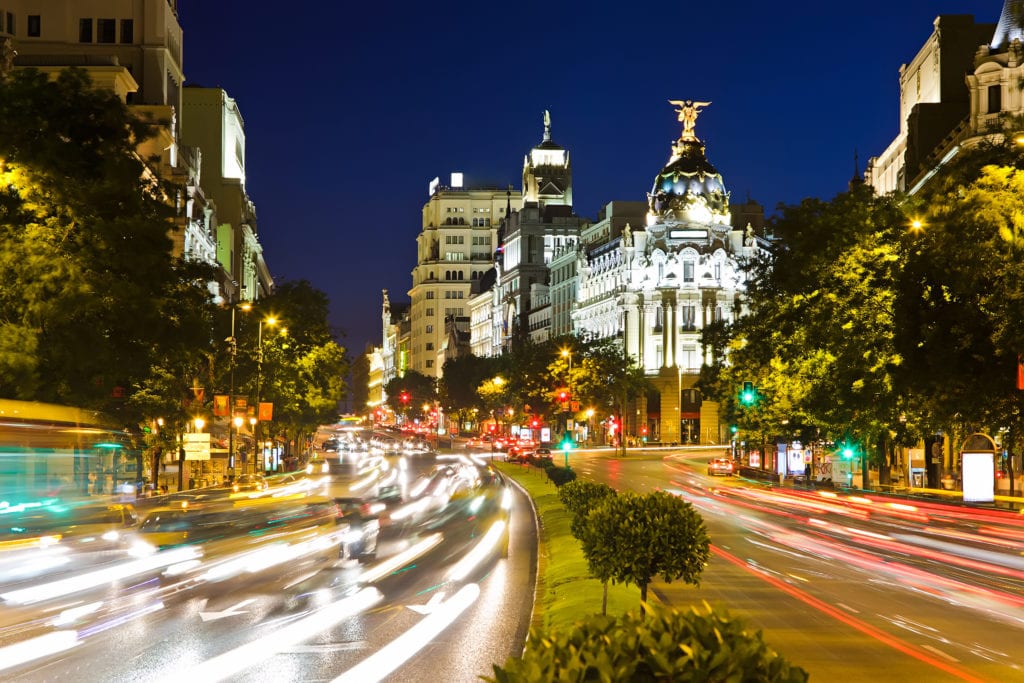
Airport options
With the closing of Torrejon (LETO) airport in 2013 to general aviation (GA) traffic, the sole airport in Madrid serving business aviation operators is Adolfo Suarez Madrid–Barajas Airport (LEMD).
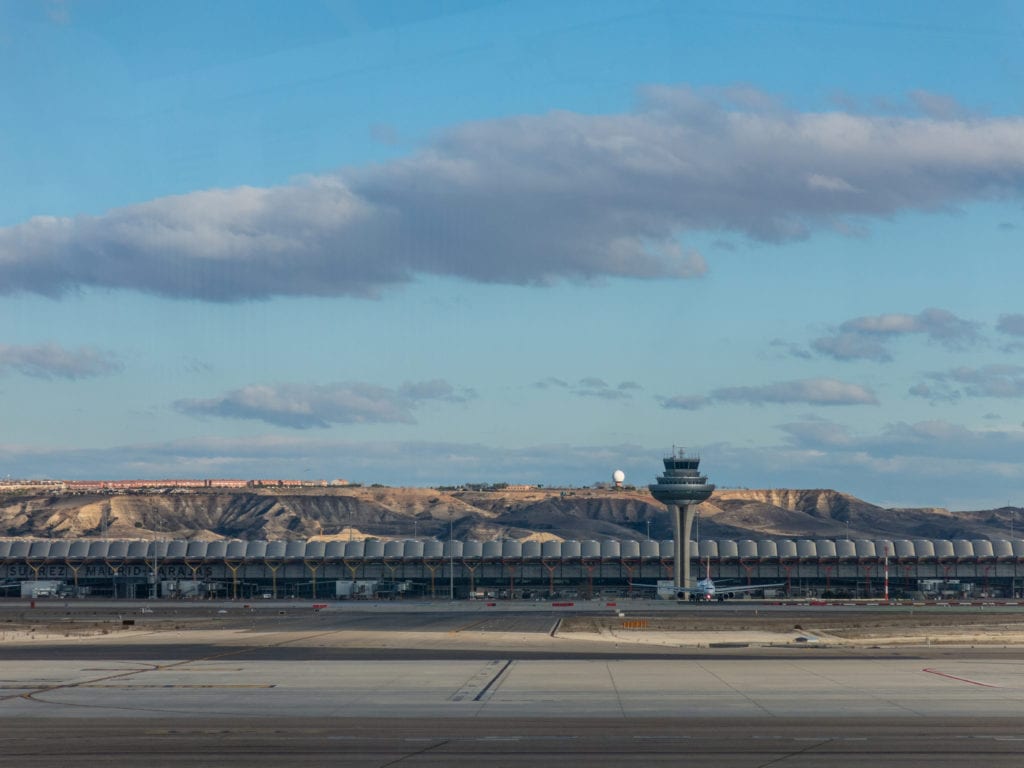
Drive time from LEMD to the city center is about 15 – 20 minutes without traffic and about 30 minutes with heavier traffic conditions.
Curfews
LEMD operates 24 hours a day. Peak hours of airline operations are 0700 – 1100 and 1200 – 1400 local, but this does not affect GA operations, as there are four runways available.
Slots
LEMD requires airport slots for all arrivals/departures. Slots are requested from the airport authority via your ground handler using a specific request format. The LEMD slot office operates 24 hours, and within an hour of a request, slot status will be known. If a slot is not available, the airport authority will offer an alternative time for the slot requested. Due to eCDM (Collaboraborative Decision Making) implementation, departure slots have 0 minutes tolerance, and flight plans must match. Aircraft parking will be confirmed simultaneously.
Because LEMD airport authorities provide equal access to airport slots for both scheduled airline and GA operations, there are usually no issues with GA slot availability.
Note: If your trip plans change, cancel any confirmed airport slots. Fines may apply if slots are not canceled.
Parking
LEMD has ample, designated GA parking and hangarage available for maintenance only, and it rarely experiences capacity issues—event during most peak periods.
Your exact parking spot, however, will not be known until the day of arrival. Some parking spots will be start-and-go, while the majority will need a push back. There’s no requirement at LEMD to carry a tow bar onboard.
FBOs and ground handling
It’s best to provide your ground handler with at least 24-hours advance notification to set up ground handling, although requests with just an hour’s advance notice can usually be accommodated. Your ground handler will coordinate airport slots, and all service requests as needed. Spain does not issue specific airport slot numbers. What needs to be added to remarks section 18 of the flight plan is the chosen handling agent and the FBO used by that handling agent, for example, HANDLING BY UNIVERSAL/FBO1. Schedule changes are only problematic if airport curfew hours are impacted.
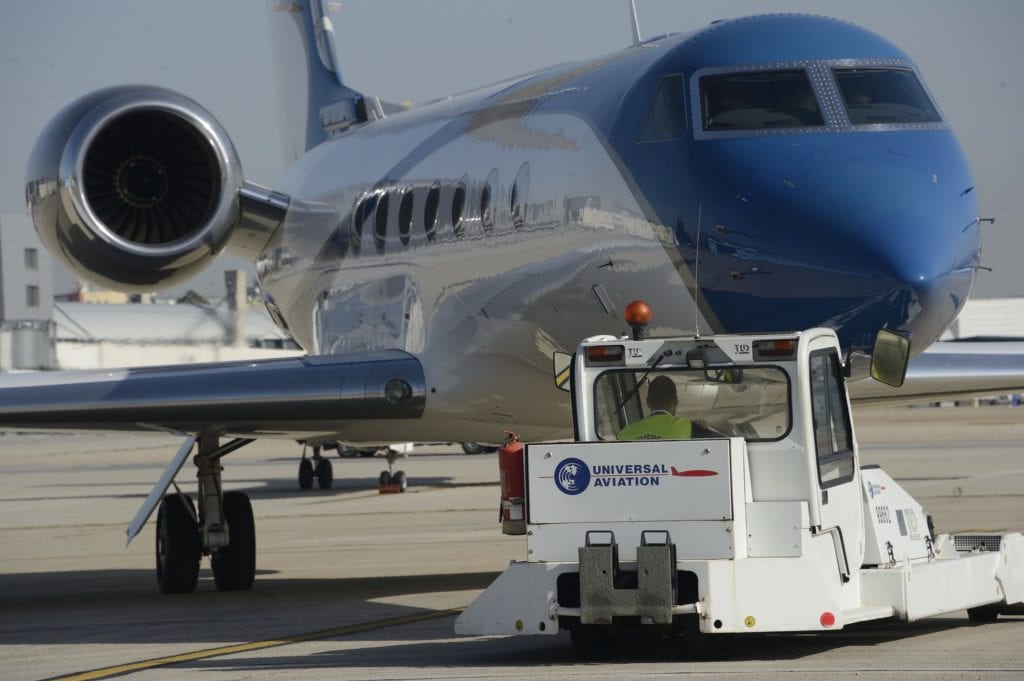
Universal Aviation Madrid is the only handler with three (3) pushbacks, and we can also perform lav and water service (without third parties).
Always provide your ground handler with aircraft type, registration (tail number), flight number if non-private flight, and estimated arrival time. GenDec is always needed, but especially for international arrivals from outside the Schengen area, provide the crew/passenger information in advance so your ground handler can advise immigration. The full schedule is needed in advance at most Spanish airports, as airport slots need to be arranged for arrivals and departures. A to-be-advised (TBA) schedule is not accepted in case airport slots are required for this reason.
All 4th-party services, including in-flight catering, transportation, and aircraft services, can be set up on credit by your ground handler. If in-flight catering menus are needed, they’ll be provided to the operator. Your ground handler will look after all government fees on credit. Ground handling charges, landing fees, and aircraft parking charges are based on maximum takeoff weight (MTOW). Airport taxes for customs/immigration services are charged based on passenger count, not crew. Estimated invoices for ground handling and all associated service charges can be generated before arrival.
Equipment
At LEMD, ground handlers have a selection of ground support equipment (GSE), including crew vans, lav, and potable water carts, ice machines, pushbacks, belt loaders, air stairs, and ground power units (GPUs).
FBOs
The facilities at the general aviation terminal (GAT) include shared crew and passenger lounges, showers, a meeting room, and onsite CIQ.
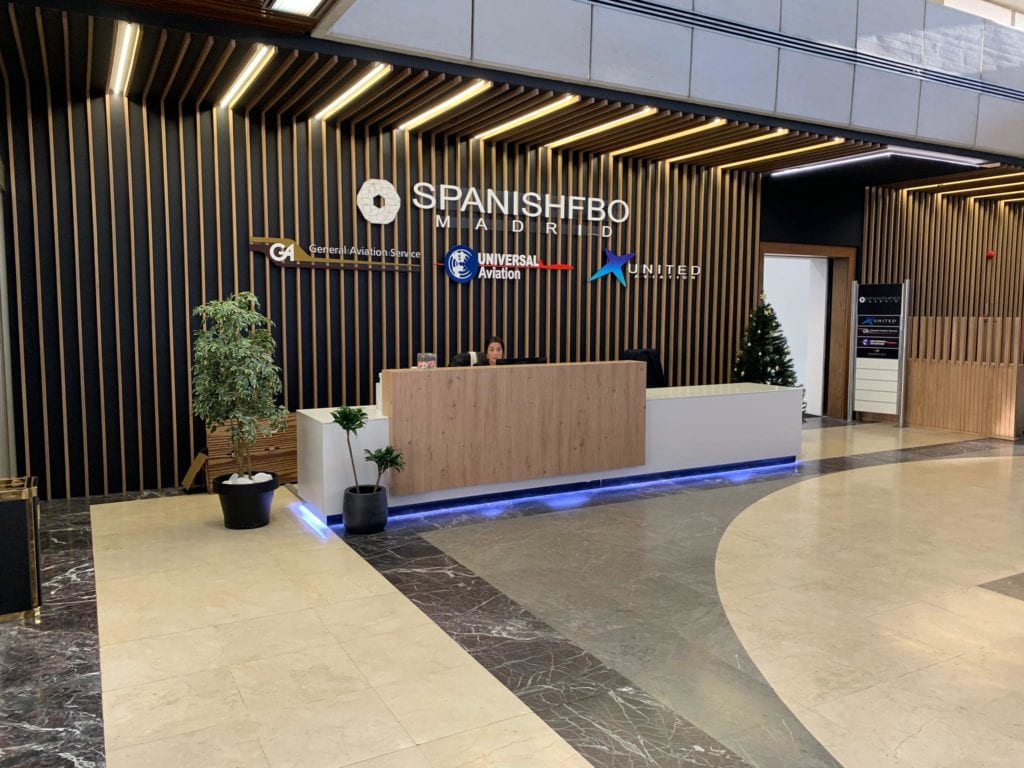
Universal Aviation Spain has an office located inside the GAT, with its own private VIP and crew lounges as well—free for its customers, without airport fees.

The new GAT features all new lounges, including a beautiful living wall.
Hotels
Good-quality hotels are available in the LEMD area, and plenty of 4- and 5-star hotel options, including major international hotel chains, can be found in the city. Cancellation policy in Spain usually is 24 hours before arrival without any cancellation fees; however, in cases of high-traffic events, or during peak season, the policy may be extended, and there may be a charge to cancel a reservation. Expect to pay $200 – 300 a night for 4-star hotel and $300 – 500 a night for 5-star properties.
Your ground handler can recommend preferred hotels in all price categories. Ground handlers have agreements and special rates with local hotels and large hotel chains. In some cases, your ground handler may be able to arrange an early check-in or late check-out at no additional cost. If you have a preferred hotel in mind, but the property is sold out, your ground handler will offer alternative options and provide availability and pricing. In most cases, the crew chooses to pay hotels directly, but, if desired, your ground handler can provide credit for all hotel bookings in Spain.
Ground transport
We recommend using prepaid local transport (with drivers) while in Spain. Rental car facilities are available at LEMD Terminal 2.
Private vehicles are not permitted on the ramp for planeside pick up at LEMD. Only 4th-party service providers with specific airport permission – which requires driver and vehicle approval, along with 250 million Euros insurance coverage – have vehicle access airside.
Fuel
Jet fuel is available at LEMD for GA aircraft via fuel trucks; however, hydrant fueling might be an option. There is a fuel truck dedicated to GA operations.
Posted aviation fuel prices change daily in Spain, and you’ll always pay a higher price when not using contract fuel or aviation fuel cards. Spain charges both value-added tax (VAT) and mineral oil tax (MOT) on non-commercial fuel uplifts. Charter (non-scheduled commercial) operators may be able to avoid VAT and MOT by showing their Air Operator Certificate (AOC) to the fueler and confirming that fuel receipt states “commercial.” Other charges associated with fuel in Spain include into-plane fees and late-night fuel surcharge at some locations. These late-night fees usually apply for fuel uplifts after 2200 local.
Aviation fuel cards are accepted for fuel payment, but consumer credit cards and Euros cash have a limit or might not be accepted at LEMD.
In-flight catering
In-flight catering is available at LEMD via two different caterers.
You can check Air Culinaire Worldwide to see catering options and menus available.
If you are flying in with catering on board, you’ll generally be permitted to offload it from your aircraft in Spain. However, it’s best to check in advance with Air Culinaire Worldwide or your local ground handler, as regulations can change at a moment’s notice.
Security
LEMD offers effective 24/7 security by police and airport authorities, along with proper fencing and CCTV surveillance. Private security (armed or unarmed) is generally not permitted airside to guard your aircraft, but this status may change in the future.
Crew and passengers must be escorted by a ground handler with security ID when on the ramp. Access to the ramp by any vendor or employee requires a unique security ID and/or a special driving license controlled by the airport authority. Security ID must be revalidated every two years, and special driving license permits allowing ramp access are valid for the same period as the holder’s driving license. Private security is not permitted on the ramp in Spain, with the exception of a few locations. Where it is permitted, an unarmed guard and a ground handling agent with appropriate security ID must accompany the security guard as per regulation. Anyone on the ramp must have clearance or be accompanied by someone who does.
As at any other major European destination, it’s essential to remain vigilant and be aware of your surroundings when off-airport. Pickpockets and petty thieves can be a risk, particularly downtown in major cities. Public transport and taxis should be avoided due to language barriers and to minimize off-airport risk. If you do have to take a public taxi, be aware that some public taxi drivers may overcharge you.
Permits
Landing permits
Landing permits are required for charter (non-scheduled commercial) and scheduled commercial operations only. All permit requests are sent to the Spanish Civil Aviation Authority (CAA). Medevac, state, and emergency flights do not require landing permits. Permit lead time is four days, and required documentation includes airworthiness, registration, and noise certificates (for LEMD).
CIQ
Upon landing, passengers/crew will be transported to customs/immigration for clearance. Clearance will take place at the airport’s GAT and usually takes around 5-10 minutes.
Two-to-three copies of the gen dec will be submitted on arrival by the handler. Any passengers/crew requiring Schengen visas must have them on arrival, or entry into the country will be prohibited. Customs has the authority to inspect luggage on arrival, even for domestic flights.
On departure, passengers/crew and luggage goes through security and x-ray screening. Customs, immigration, and security clearance for international departures should take no more than 10 minutes.
Weather
Due to Madrid’s high altitude of 650 meters, it experiences quite different temperatures in the summer and the winter. The most pleasant warm weather falls between May and mid-July when average temperatures are between 20 and 32 degrees Celsius (68°F – 90°F).
Towards the end of July, and throughout August, it can get hot with temperatures sometimes reaching 40 degrees Celsius (100°F). Night-time temperatures remain around 18 degrees Celsius (64°F). However, the climate in Madrid is low in humidity, therefore making the high temperatures easier to tolerate.
September is a pleasant month, with temperatures back down to around 25 degrees Celsius (77°F). October is also still reasonably warm, with an average daytime temperature of 20 degrees Celsius (68°F) and is always a pleasant time to visit.
The weather in Madrid is predominantly dry, but that doesn’t mean that rain can be ruled out. Especially in the winter months. Do bear in mind that these temperatures are averages, and the weather may fluctuate from the normal
In November, the temperatures drop, and the daily average is 12 degrees Celsius (55°F), dropping to 9 degrees Celsius (48°F) in December. www.madrid-tourist-guide.com
Tech stops
Tech stops can be accomplished within one hour in most cases. International tech stops require no customs or immigration clearance.
Peak season
Madrid (LEMD) experiences a high season with elevated traffic levels in May-July due to several events and also from October to January due to hunting season.
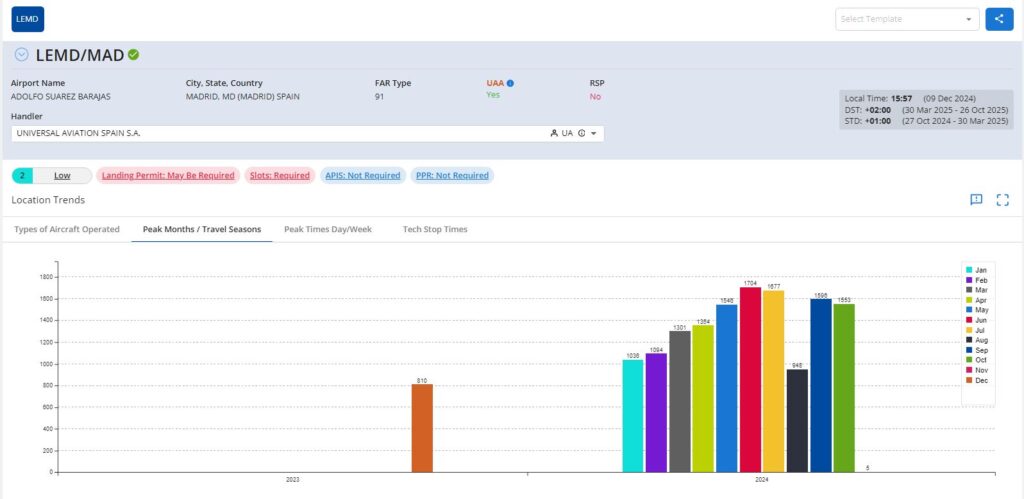
Conclusion
Your next mission to Madrid should be a smooth one with a little advanced planning. At Universal, we have the expertise and resources to make your next mission a success. Request a free trip cost estimate to get started.
Also, when you use us for ground support in Madrid, you’ll have access to private VIP and passenger lounges not available to everyone else.




